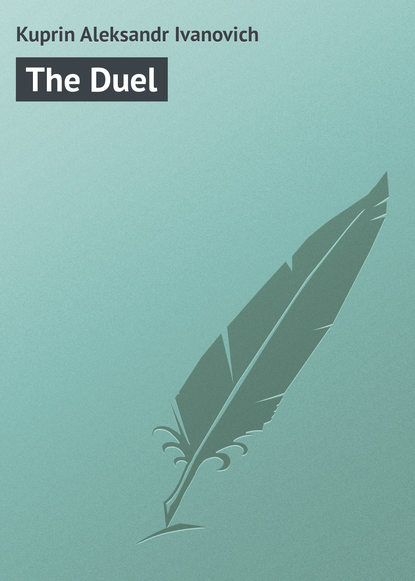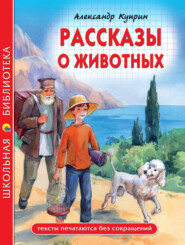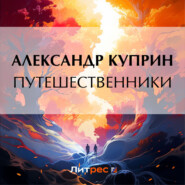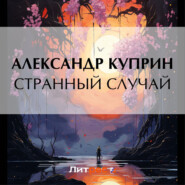По всем вопросам обращайтесь на: info@litportal.ru
(©) 2003-2024.
✖
The Duel
Настройки чтения
Размер шрифта
Высота строк
Поля
“That will do now – Romochka, you awkward creature! again you’ve forgotten to kiss my hand. That’s right! Now the other. But don’t forget,” she added in a hot whisper, “that to-day is our day. Tsarina Alexandra and her trusty knight, Georgi. Come.”
“One instant – look here – you’ll allow me? It’s a very modest gift.”
“What? Scent? What nonsense is this? No, forgive me; I’m only joking. Thanks, thanks, dear Romochka. Volodya,” she called out loudly in an unconstrained tone as she entered the room, “here is another friend to join us in our little picnic.”
As is always the case before dispersing for a general excursion, there was much noise and confusion in the drawing-room. The thick tobacco smoke formed here and there blue eddies when met by the sunbeams on its way out of the window. Seven or eight officers stood in the middle of the room, in animated conversation. The loudest among them was the hoarse-voiced Taliman with his everlasting cough. There were Captain Osadchi and the two inseparable Adjutants, Olisár and Biek-Agamalov; moreover, Lieutenant Andrusevich – a little, lithe, and active man, who, in his sharp-nosed physiognomy, resembled a rat – and Sofia Pavlovna Taliman, who, smiling, powdered, and painted, sat, like a dressed-up doll, in the middle of the sofa, between Ensign Michin’s two sisters. These girls were very prepossessing in their simple, home-made but tasteful dresses with white and green ribbons. They were both dark-eyed, black-haired, with a few summer freckles on their fresh, rosy cheeks. Both had dazzlingly white teeth which, perhaps from their not irreproachable form and evenness, gave the fresh lips a particular, curious charm. Both were extraordinarily like, not only each other, but also their brother, although the latter was certainly not a “beauty” man. Of the ladies belonging to the regiment who were invited were Mrs. Andrusevich – a little, fat, podgy, simple, laughing woman, very much addicted to doubtful anecdotes – and, lastly, the really pretty, but gossiping and lisping, Misses Lykatschev.
As is always the case at military parties, the ladies formed a circle by themselves. Quite near them, and sitting by himself, Staff-Captain Ditz, the coxcomb, was lolling indolently in an easy chair. This officer, who, with his tight-laced figure and aristocratic looks, strongly reminded one of the well-known Fliegende Blätter type of lieutenants, had been cashiered from the Guards on account of some mysterious, scandalous story. He distinguished himself by his unfailing ironical confidence in his intercourse with men, and his audacious boldness with women, and he pursued, carefully and very lucratively, card-playing on a big scale, not, however, in the mess-room, but in the Townsmen’s Club, with the civilian officials of the place, as well as with the Polish landowners in the neighbourhood. Nobody in the regiment liked him, but he was feared, and all felt within themselves a certain rough conviction that some day a terrible, dirty scandal would bring Ditz’s military career to an abrupt conclusion. It was reported that he had a liaison with the young wife of an old, retired Staff-Captain who lived in the town, and also that he was very friendly with Madame Taliman. It was also purely for her sake he was invited to officers’ families, according to the curious conceptions of good tone and good breeding that still hold sway in military circles.
“Delighted – delighted!” was Nikoläiev’s greeting as he went up to Romashov. “Why didn’t you come this morning and taste our pasty?”
Nikoläiev uttered all this in a very jovial and friendly tone, but in his voice and glance Romashov noticed the same cold, artificial, and harsh expression which he had felt almost unconsciously lately.
“He does not like me,” thought Romashov. “But what is the matter with him? Is he angry – or jealous, or have I bored him to death?”
“As you perhaps are aware, we had inspection of rifles in our company this morning,” lied Romashov boldly. “When the Great Inspection approaches, one is never free either Sundays or week-days, you know. However, may I candidly admit that I am a trifle embarrassed? I did not know in the least that you were giving a picnic. I invited myself, so to speak. And truly, I feel some qualms – ”
Nikoläiev smiled broadly, and clapped Romashov on the shoulder with almost insulting familiarity.
“How you talk, my friend! The more the merrier, and we don’t want any Chinese ceremonies here. But there is one awkward thing – I mean, will there be sufficient carriages? But we shall be able to manage something.”
“I brought my own trap,” said Romashov, to calm him, whilst he, quite unnoticeably, released his shoulder from Nikoläiev’s caressing hand, “and I shall be very pleased to put it at your service.”
Romashov turned round and met Shurochka’s eye. “Thank you, my dear,” said her ardent, curiously intent look.
“How strange she is to-day,” thought Romashov.
“That’s capital!” Nikoläiev looked at his watch. “What do you say, gentlemen; shall we start?”
“‘Let us start,’ said the parrot when the cat dragged it out of its cage by the tail,” said Olisár jokingly.
All got up, noisy and laughing. The ladies went in search of their hats and parasols, and began to put on their gloves. Taliman, who suffered from bronchitis, croaked and screamed that, above everything, the company should wrap up well; but his voice was drowned in the noise and confusion. Little Michin took Romashov aside and said to him —
“Yuri Alexievich, I have a favour to ask you. Let my sisters ride in your carriage, otherwise Ditz will come and force his society on them – a thing I would prevent at any price. He is in the habit of conversing with young girls in such a way that they can hardly restrain their tears of shame and indignation. I am not, God knows! a man fond of violence, but some day I shall give that scoundrel what he deserves.”
Romashov would naturally have much liked to ride with Shurochka, but Michin had always been his friend, and it was impossible to withstand the imploring look of those clear, true-hearted eyes. Besides, Romashov was so full of joy at that moment that he could not refuse.
At last, after much noise and fun, they were all seated in the carriages. Romashov had kept his word, and sat stowed away between the two Michin girls. Only Staff-Captain Lieschtschenko, whose presence Romashov now noticed for the first time, kept wandering here and there among the carriages with a countenance more doleful and woebegone than ever. All avoided him like the plague. At last Romashov took pity and called to him, and offered him a place on the box-seat of his trap. The Staff-Captain thankfully accepted the invitation, fixed on Romashov a long, grateful look from sad, moist dog’s eyes, and climbed up with a sigh to the box.
They started. At their head rode Olisár on his lazy old horse, repeatedly performing clown tricks, and bawling out a hackneyed operetta air: “Up on the roof of the omnibus,” etc.
“Quick – march!” rang Osadchi’s stentorian voice. The cavalcade increased its pace, and was gradually lost sight of amidst the dust of the high road.
XIII
THE picnic gave no promise of being anything like so pleasant and cheerful as one might have expected from the party’s high spirits at the start. After driving three versts, they halted and got out at Dubetschnaia. By this name was designated a piece of ground hardly fifteen dessyatins in extent, which, sparsely covered with proud, century-old oaks, slowly slanted down towards the strand of a little river. Close thickets of bushes were arrayed beside the mighty trees, and these, here and there, formed a charming frame for the small open spaces covered by the fresh and delicate greenery of spring. In a similar idyllic spot in the oak-woods, servants and footmen, sent on in advance, waited with samovars and baskets.
The company assembled around the white tablecloths spread on the grass. The ladies produced plates and cold meat, and the gentlemen helped them, amidst jokes and flirtations. Olisár dressed himself up as a cook by putting on a couple of serviettes as cap and apron. After much fun and ceremony, the difficult problem of placing the guests was solved, in which entered the indispensable condition that the ladies should have a gentleman on each side. The guests half-reclined or half-sat in rather uncomfortable positions, which was appreciated by all as being something new and interesting, and which finally caused the ever-silent Lieschtschenko to astonish those present, amidst general laughter, by the following famous utterance: “Here we lie, just like the old Greek Romans.”
Shurochka had on one side Taliman, on the other side Romashov. She was unusually cheerful and talkative, nay, sometimes in such high spirits that the attention of many was called to it. Romashov had never found her so bewitching before. He thought he noticed in her something new, something emotional and passionate, which feverishly sought an outlet. Sometimes she turned without a word to Romashov and gazed at him intently for half a second longer than was strictly proper, and he felt then that a force, mysterious, consuming, and overpowering, gleamed from her eyes.
Osadchi, who sat by himself at the end of the improvised table, got on his knees. After tapping his knife against the glass and requesting silence, he said, in a deep bass voice, the heavy waves of sound from which vibrated in the pure woodland air —
“Gentlemen, let us quaff the first beaker in honour of our fair hostess, whose name-day it is. May God vouchsafe her every good – and the rank of a General’s consort.”
And after he had raised the great glass, he shouted with all the force of his powerful voice —
“Hurrah!”
It seemed as if all the trees in the vicinity sighed and drooped under this deafening howl, which resembled the thunder’s boom and the lion’s roar, and the echo of which died away between the oaks’ thick trunks. Andrusevich, who sat next to Osadchi, fell backwards with a comic expression of terror, and pretended to be slightly deaf during the remainder of the banquet. The gentlemen got up and clinked their glasses with Shurochka’s. Romashov purposely waited to the last, and she observed it. Whilst Shurochka turned towards him, she, silently and with a passionate smile, held forward her glass of white wine. In that moment her eyes grew wider and darker, and her lips moved noiselessly, just as if she had clearly uttered a certain word; but, directly afterwards, she turned round laughing to Taliman, and began an animated conversation with him. “What did she say?” thought Romashov. “What word was it that she would not or dared not say aloud?” He felt nervous and agitated, and, secretly, he made an attempt to give his lips the same form and expression as he had just observed with Shurochka, in order, by that means, to guess what she said; but it was fruitless. “Romochka?” “Beloved?” “I love?” No, that wasn’t it. Only one thing he knew for certain, viz., that the mysterious word had three syllables.
After that he drank with Nikoläiev, and wished him success on the General Staff, as if it were a matter of course that Nikoläiev would pass his examination. Then came the usual, inevitable toasts of “the ladies present,” of “women in general,” the “glorious colours of the regiment,” of the “ever-victorious Russian Army,” etc.
Now up sprang Taliman, who was already very elevated, and screamed in his hoarse, broken falsetto, “Gentlemen, I propose the health of our beloved, idolized sovereign, for whom we are all ready at any time to sacrifice our lives to the last drop of our blood.”
At the last words his voice failed him completely. The bandit look in his dark brown, gipsy eyes faded, and tears moistened his brown cheeks.
“The hymn to the Tsar,” shouted little fat Madame Andrusevich. All arose. The officers raised their hands to the peaks of their caps. Discordant, untrained, exultant voices rang over the neighbourhood, but worse and more out of tune than all the rest screamed the sentimental Staff-Captain Lieschtschenko, whose expression was even more melancholy than usual.
They now began drinking hard, as, for the matter of that, the officers always did when they forgathered at mess, at each other’s homes, at excursions and picnics, official dinners, etc. All talked at once, and individual voices could no longer be distinguished. Shurochka, who had drunk a good deal of white wine, suddenly leaned her head near Romashov. Her cheeks and lips glowed, and the dark pupils of her beaming eyes had now attained an almost black hue.
“I can’t stand these provincial picnics,” she exclaimed. “They are always so vulgar, mean, and wearisome. I was, of course, obliged to give a party before my husband started for his examination, but, good gracious! why could we not have stayed at home and enjoyed ourselves in our pretty, shady garden? Such a stupid notion. And yet to-day, I don’t know why, I am so madly happy. Ah, Romochka, I know the reason; I know it, and will tell you afterwards. Oh, no! No, no, Romochka, that is not true. I know nothing – absolutely nothing.”
Her beautiful eyes were half-closed, and her face, full of alluring, promising, and tormenting impatience, had become shamelessly beautiful, and Romashov, though he hardly understood what it meant, was instinctively conscious of the passionate emotion which possessed Shurochka and felt a sweet thrill run down his arms and legs and through his heart.
“You are so wonderful to-day – has anything happened?” he asked in a whisper.
She answered straightway with an expression of innocent helplessness. “I have already told you – I don’t know – I can’t explain it. Look at the sky. It’s blue, but why? It is the same with me. Romochka, dear boy, pour me out some more wine.”
At the opposite side of the tablecloth an exciting conversation was carried on with regard to the intended war with Germany, which was then regarded by many as almost a certainty. Soon an irritable, senseless quarrel arose about it, which was, however, suddenly interrupted by Osadchi’s furious, thundering, dictatorial voice. He was almost drunk, but the only signs of it were the terrible pallor of his handsome face and the lowering gaze of his large black eyes.
“Rubbish!” he screamed wildly. “What do you really mean by war nowadays? War has been spoilt, transmogrified, and everything else, for the matter of that. Children are born idiots, women are stunted, badly brought-up creatures, and men have – nerves. ‘Ugh, blood, blood! Oh, I shall faint,’” he imitated in an insulting, mockingly pitiful tone. “And all this only because the real, ferocious and merciless character of war has changed. Now, can this be called war when you fire a couple of shots at the enemy at a distance of fifteen versts, and then return home in triumph as a hero? Pretty heroes! You are taken prisoner, and then they say to you: ‘My poor friend, how are you? Are you cold? Would you like a cigarette? Are you quite comfortable?’ Damn it all!” Osadchi gave vent to a few inarticulate roars and lowered his head like a mad bull ready to attack. “In the Middle Ages, gentlemen, things were quite different. Night attacks – storming ladders and naked weapons – murder and conflagration everywhere. ‘Soldiers, the town is yours for three days.’ The slaughter begins, torch and sword perform their office; in the streets streams of blood and wine. Oh, glorious festival of brave men amidst bleeding corpses and smoking ruins, beautiful, naked, weeping women dragged by their hair to the victor’s feet.”
“Anyhow, you haven’t changed much,” interrupted Sofia Pavlovna Taliman jokingly.
“All the town a river of fire, the tempest sporting at night with the bodies of hanged men; vultures shriek and the victor lords it by the campfires beneath the gallows tree. Why take prisoners and waste time and strength for them? Ugh!” Osadchi, with teeth clenched, groaned like a wild beast. “Grand and glorious days! What fights! Eye to eye and chest to chest. An uninterrupted slaughter for hours, till the cold-blooded tenacity and discipline of one party, coupled with invincible fury, brought victory. And what fights then! What courage, what physical strength, and what superior dexterity in the use of weapons! Gentlemen” – Osadchi arose in all his gigantic stature and in his terrible voice insolence and cold-bloodedness reigned – “gentlemen, I know that from your military colleges have issued morbid, crazy phrases about what’s called ‘humanity in war,’ etc., etc. But I drink at this moment – even if I am to drain my glass by myself – to the wars of bygone days and the joyful, bloody cruelty of old times.”
All were silent, hypnotized and cowed by this unexpected horrible ecstasy of an otherwise reserved and taciturn man, whom they now regarded with a feeling of terror and curiosity. At that moment Biek-Agamalov jumped up from where he was sitting. He did this so quickly and suddenly that he alarmed several who were present, and one of the ladies uttered a cry of terror. His widely staring eyes flashed wildly, and his white, clenched teeth resembled a beast of prey’s. He seemed to be nearly stifled, and he could not find words.
“Oh, see! here’s one who understands and rejoices at what you have said. Ugh!” With convulsive energy, nay, almost furiously, he grasped and shook Osadchi’s hand. “To hell with all these weak, cowardly, squeamish wretches! Out with the sabre and hew them down!”
His bloodshot eyes sought an object suitable as a vent for his flaming rage. His naturally cruel instincts had at this moment thrown off their mask. Like a madman he slashed at the oak-copse with his naked sword. Mutilated branches and young leaves rained down on the tablecloth and guests.
“Lieutenant Biek! Madman! Are you out of your mind?” screamed the ladies.
Biek-Agamalov pulled himself together and returned to his place, visibly much ashamed of his barbaric behaviour; but his delicate nostrils rose and fell with his quick breathings, and his black eyes, wild with suppressed rage, looked loweringly and defiantly at the company.
Romashov had heard, and yet not heard, Osadchi’s speech. He felt, as it were, stupefied by a narcotic, but celestially delightful, intoxicating drink, and he thought that a warm spider, as soft as velvet, had been spinning softly and cautiously round him with its web, and gently tickled his body till he almost died of an inward, exultant laughter. His hand lightly brushed – and each time as though unintentionally – Shurochka’s arm, but neither she nor he attempted to look at each other. Romashov was quite lost in the land of dreams, when the sound of Biek-Agamalov’s and Osadchi’s voices reached him, but as though they came from a distant, fantastic mist. The actual words he could understand, but they seemed to him empty and devoid of any intelligent meaning.

















